Archive for February, 2014
February 21, 2014 @ 9:00 pm | Filed under:
Books Superquick!
Middlemarch, chapter 14
With Rose and Beanie:
• a section of Wormwood Forest
• “Lines” by Martha Collins
• Sonnets #18, 29, and 130, Shakespeare
Helped Rose study her falconry manual
Friday is Journey North day, so not a huge reading day for any of us.
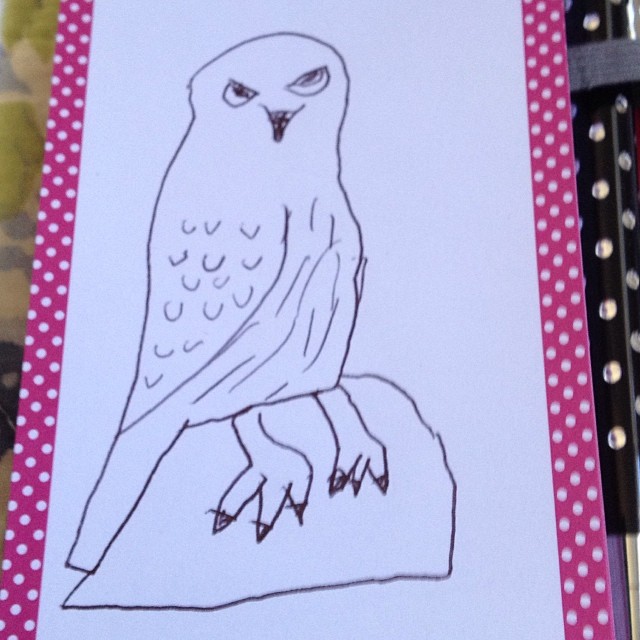
Hawk by Rilla
February 20, 2014 @ 9:05 pm | Filed under:
Books 
I’m not going to have time to post anything significant in the next couple of weeks, but I thought I might try jotting down a few quick reading notes each day, just to keep the blog warm.
Early a.m.: Middlemarch chapter 13.
“The banker’s speech was fluent, but it was also copious, and he used up an appreciable amount of time in brief meditative pauses.”
Mid-morning, with Rose and Bean:
Landmark History of the American People, first half of the Eli Whitney chapter.
Story of Science: Keppler.
Poem: “The Blue Bowl” by Jane Kenyon.
Marlowe’s “The Passionate Shepherd to His Love” and Ralegh’s “The Nymph’s Reply”—neither of the girls had read these before, so we had ourselves a good time. I remarked that I would have said yes to the shepherd, and Rose laughed and said, “You did.”
With Beanie:
Sir Gawain and the Green Knight, first half of Fytte the Second. Bit heavy on the armor & weapon descriptions, but good golly is the language delightful. All that alliteration.
With Rose (on separate Kindles):
Bird by Bird, introduction
After lunch, with Rilla:
The Blue Fairy Book, “East of the Sun, West of the Moon”
Tumtum and Nutmeg, finally finished the Christmas story
Milly-Molly-Mandy, next chapter.
Early afternoon:
Snatched a few minutes’ reading time before a meeting, started Howard’s End Is on the Landing. Have been looking forward to this one—Susan Hill’s memoir about spending a year reading only books she already owned. I’ve had that same urge myself more than once! I think it’s going to be a fun read even though she’s a bit crotchety on the subject of the internet: its “insidious, corrosive effect” “fragmenting the brain,” leading to “mental malnutrition,” etc etc. By the time she got to those “infernal systems on websites” that allow you to catalog your books, I was rolling my eyes pretty hard. Don’t go knocking my GoodReads! But I’ll give her a chance. I have a soft spot for curmudgeonly types.
February 19, 2014 @ 8:11 pm | Filed under:
Books 
Early a.m.: Middlemarch chapter 12.
Particularly struck by how skillfully Eliot builds tension in the first visit to Stone Court—Featherstone ordering Fred to get a letter from Bulstrode averring he doesn’t believe Fred made promises about paying debts out of his expected inheritance. How rapidly this escalates! Featherstone has already made it clear to his sister, Mrs. Waule, that he thinks the rumor is “stuff and nonsense…a got-up story” and he defends Fred against her insinuations. “Such a fine, high-spirited fellow is like enough to have [expectations].” But then after Mrs. Waule leaves, Featherstone whips out the accusations, almost teasingly, and the order to get a letter from Bulstrode has the air of a whim, at first. And suddenly there Fred is in a terribly awkward situation that is only going to get awkwarder, and eventually quite serious. It’s a gripping conflict, it puts us squarely in Fred’s corner while leaving us under no illusions that his imprudence (those fine high spirits) has helped put him in this pickle. Featherstone is utterly believable, a difficult person who enjoys being difficult, and who enjoys having scraps of power over people. All the rest of the morning my mind kept coming back to this scene, picking over how artfully Eliot created a major conflict (in plot terms) out of a fragment of gossip.
Midday: Finished Underfoot in Show Business.
Am now bereft: it was the last (well, the first for her, but the last for me) of Helene’s memoirs. I wish she’d written five more. The tales in this one: so rich! That first summer she spends at the artist’s colony—sitting down at the desk in her quiet studio and seeing Thornton Wilder’s name written on the plaque listing all the previous occupants of this cabin. He’d stayed there in 1937; she realizes he’d written Our Town in this very spot. For a moment it throws her—I completely understood that wave of comparative despair—until she registers that in the long list of writers under Wilder, there’s no one she ever heard of. This makes her feel better, and then she’s able to work.
And the early story about how she gets to NYC in the first place—winning a fellowship for promising young playwrights. Late 30s, the second year of the award. In the first year, the two winners were given $1500 apiece and sent out to make their way in the world. In Helene’s year, the TheatreGuild decides to bring the three fellowship winners (Helene is the youngest, and the only female) to New York to attend a year-long seminar along with some other hopeful playwrights. The $1500 prize pays her expenses during this year of what sounded very similar to a modern MFA program, minus the university affiliation: classes with big-name producers, directors, and playwrights. Lee Strasberg! An unprecedented opportunity for these twelve young seminar attendees. And the fruit of this careful nurturing? Helene, chronicling the story decades later, rattles off the eventual career paths of the students: there’s a doctor, a short-story writer, a TV critic, a couple of English professors, a handful of screenwriters.
“The Theatre Guild, convinced that fledgling playwrights need training as well as money, exhausted itself training twelve of us—and not one of the twelve ever became a Broadway playwright.
“The two fellowship winners who, the previous year, had been given $1500 and sent wandering off on their own were Tennessee Williams and Arthur Miller.”
I laughed my head off when I read that.
February 18, 2014 @ 9:10 pm | Filed under:
Books 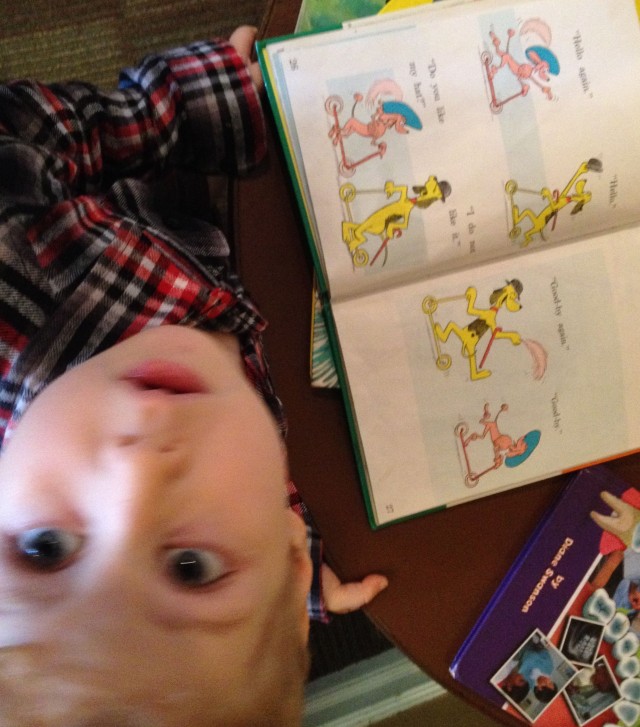
I’m not going to have time to write anything thinky in the next couple of weeks, but I thought I might try jotting down a few quick reading notes each day, just to keep the blog warm.
Last week I decided to try something new: instead of reaching for my phone and checking my mail when I wake up, I’m reaching for my phone and reading a book. My boys wake up très early and get to watch TV for 30 or 40 minutes before Scott and I drag ourselves out of bed. Usually I use that time to doze, and then check in on everything that’s piled up in my inbox during the East Coast’s head start on the day. But I’m always grumping about not having enough time to read—I fall asleep three pages in, every night—so I thought I’d give a morning reading session a go. It’s been quite nice. I have eleventy-thousand books queued up, so naturally I decided to reread Middlemarch. (I’ve given up trying to figure out my capricious reading whims anymore. If a book insists it wants to be read, I read it.)
This is my third trip to Middlemarch. Read it first the year between college and grad school, when I was working as a publicist for my undergrad alma mater’s drama department and trying to fill in gaps my English degree hadn’t. Loved the novel, had trouble settling on anything else for a long while after. Reread it a few years ago—I could check my archives here to find out when—and loved it even harder. And now here I go again. Why is it I’m hollering at Dorothea every time and yet she still goes and marries him?
So anyway, this morning it was a chapter and a half of Middlemarch (enter Fred Vincy, munching on a grilled bone).
Later: the first section of Sir Gawain and the Green Knight with Rose and Bean.
Poem: “The Summer I Was Sixteen” by Geraldine Connolly.
After lunch: a couple of chapters of Helene Hanff’s Underfoot in Show Business, which is making me deliriously happy.
Assorted articles online.
No picture books! Made a Staples run in the early afternoon that ate up our Rillabook window.
“No doubt it has happened to many of you to pick up in a happy moment some book or pamphlet or copy of verse which just says the word you have unconsciously been listening for, almost craving to speak for yourself, and so sends you off hot-foot on the trail. And if you have had that experience, it may also have happened to you that, after ranging, you returned on the track ‘like faithful hound returning,’ in gratitude, or to refresh the scent; and that, picking up the book again, you found it no such wonderful book after all, or that some of the magic had faded by process of the change in yourself which itself had originated. But the word was spoken.”
—from The Art of Reading by Sir Arthur Quiller-Couch
February 16, 2014 @ 9:31 pm | Filed under:
Television 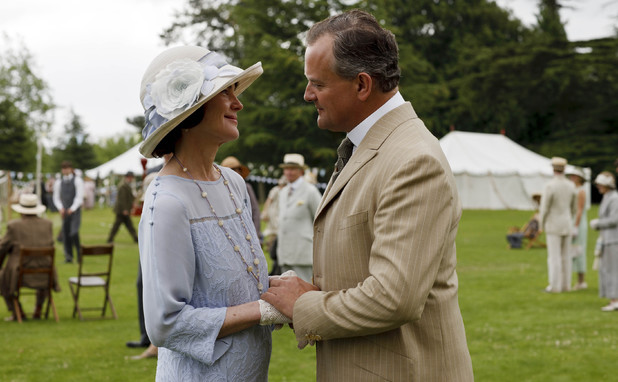
Darling, I’m so glad you survived your time in the land of Prohibition.
(UK / DVD episode 8. Also, spoilers below.)
Proving it has its priorities firmly in place, this episode starts with the VIPs: the Very Important Pigs. Look at ’em, up and drinking, fat and sassy! Oh, what a relief. I’m only sorry we never got to meet that dastardly fellow, the Negligent Pigman. After the great trough catastrophe, Tom and Mary have decided to offer sturdy Mr. Drew, whose devotion to Yew Tree Farm has proven his mettle, the job of Keeper of the Pigs.
Let’s just take a moment to savor this: Downton Abbey is full of grown men and women who require another adult’s help to change clothes three times a day, but Mr. Drew can be trusted to tend these somewhat delicate Pigs and FARM AN ENTIRE FARM. In fact, he’s so reliable that Edith is eyeing him as a potential foster father for her child. (She’ll be talked out of that by Aunt Rosamund, but that comes later.) For once I’m not making fun of the show; I think this is a pretty realistic depiction. I have no doubt that Mr. Drew is fully capable of running his farm and tending the Pigs. And while Mary has shown that she can do a hard night’s work in an extraordinary circumstance (and even elegantly scramble an egg afterward), it’s amusing how different the family’s definition of “farming” is from Mr. Drew’s. When Mary and Robert speak of “farming Downton themselves,” they mean making plans and hiring people to carry them out. When Mr. Drew speaks of farming, he means getting up at 4:30 in the morning to check on the Grantham Pigs before milking his own cow.
A recurring theme throughout the four seasons of this show has been how much happier the upstairs crowd is when they have some real work to do. During the War, we saw Edith blossom as an aide to the recovering soldiers (and, later, as a newspaper columnist), and Sybil grew from a restless cause-seeker to a woman who found real satisfaction in her nursing duties. We began this season with Mary and Isobel in zombie states, six months after Matthew’s death. The spark came back into Mary when she was nudged into taking an interest in the management of the estate, and Violet basically applied a bellows to Isobel, dumping the problem of Carson’s down-and-out former friend in Isobel’s lap, fanning the embers of her do-gooder zeal back into the fire she runs on.
We’ve seen it with Cora, too, this season: so many scenes in which she looks absently up from a book, smiles benignly, and does nothing of consequence—she has seemed more like an amiable ghost than a person whose actions have any effect on the world. This week, Cora was zooming around in a whirl of bazaar preparations, and although her somewhat vapid remarks seemed designed to elicit eye-rolls from her family as well as the audience, the truth is that organizing an event on the scale of that one is a mammoth undertaking. If you tried to assign me that job, I’d run away with the Pigman. I appreciated Tom’s insightful “beast of burden” remark near the end of the episode, his recognition of how hard Cora had toiled over the bazaar. I still found myself wanting to roll my eyes at everything Cora said—I’m serious when I say I think the script wanted me to—but Tom’s right. We very seldom see Cora at work, but she does work. There are parts of her job she could do a great deal better; she’s been only superficially aware of Edith’s misery and Rose’s mischief all season. But she organized a mighty impressive bazaar, and I’m glad Tom gave her her props.
(more…)
February 14, 2014 @ 10:09 am | Filed under:
Books 
My Helene Hanff kick (about which more later) continues—after Duchess of Bloomsbury Street, I tore through Q’s Legacy, and yesterday when Underfoot in Show Business arrived via interlibrary loan, I squealed and quit work half an hour early to dive in. This binge got me thinking about how much I enjoy memoir. I asked my Facebook friends what their favorites are, and the list could swallow a whole year of reading time. I think you should be able to view it even if you aren’t on Facebook—or does FB make you log in to read anything there, even the public threads?
I’ll try to get the list moved over here at some point, but I’m afraid I won’t have any free time until I’ve finished reading Underfoot. Oh Helene, Helene, I wish you’d written thirty memoirs.
***
Wait! I realized I could just paste in the thread. But then I worried my friends might not want their names and faces plastered on my blog, so I’ve stripped out everything except the book comments. Forgive the lack of formatting!
Please add your own favorites in the comments! I have a few to contribute too, later. And happy Valentine’s Day, everyone.
***
Gladys Taber’s Stillmeadow Books.
Corrie Ten Boom’s The Hiding Place
Tender at the Bone, Ruth Reichl
The Glass Castle, Jeannette Walls
Someone already said Glass Castle, so I’ll throw in A Girl Named Zippy by Haven Kimmel.
Any of Caroline Knapp’s.
Seven Storey Mountain
Glass Castle for me too.
Like all of the above but Glass Castle, hands down not only my favorite memoir but a favorite book of all time.
I really liked Rumer Godden’s– and I’m on a Godden kick this week– A Time To Dance, No Time To Weep is the first volume and A House with Four Rooms is the second.
The Egg and I by . . . Betty MacDonald, I think?
Beyond Dark Hills Jesse Stuart
Booked: Literature in the Soul of Me by Karen Swallow Prior
My favorite genre,so hard to pick. Ambulance Girl, Glass Castle, On Gold Mountain , any Annie LaMott, Helen Hanff, Florence King, Alexandra Fuller, Thunderbolt Kid, any Mitford,Quentin Crisp, Christopher Isherwood …..
Glass Castle.
Good call on Betty MacDonald and Florence King. Add Shirley Jackson (Life Among the Savages) to that list.
Just Kids by Patti Smith
I liked The Spiral Staircase by Karen Armstrong (think you’d really like it) and I like Dance of the Dissident Daughter by Sue Monk Kidd, too.
The Chronology of Water by Lidia Yuknavitch
Nancy and Lawrence Goldstone’s Used and Rare: Travels in the Book World (one of my favorites and since you like 84, Charing Cross Road you might enjoy this one).
I loved Sidney Poitier’s Measure of a Man.
It’s Always Something by Gilda Radner.
Angela’s Ashes
Period Piece, Raverat
An American Childhood by Annie Dillard
Love all Gladys Faber, and Anne Morrow Linbergh. And for comic fun, Bill Bryson’s Walk in the Woods!
Anything by Nancy Mitford.
Not So Wild A Dream by Eric Sevareid. Brilliantly written.
Not Even Wrong by Paul Collins. The only “autism memoir” I love. He is amazing.
I don’t know if it’s my favorite, but The Glass Castle has stuck with me.
The Girl From Yam Hill
A Private History of Awe by Scott Russell Sanders
I’ve been meaning to read WILD forever now and I always loved IN PATAGONIA by Bruce Chatwin–which is maybe more travelogue than memoir–but it has stayed with me.
In a Sunburned Country by Bill Bryson is just so funny and learning about Australia is fascinating.
The Middle Place. Or any of Anne Lamotts.
The Moon’s a Balloon by David Niven. But I haven’t read many.
O I love this! I’m so into memoirs recently, I love to hear people telling their stories. What a great resource this list is. I hate to have to choose a favorite anything, but let me add from recent reading Journal of Best Practices. I don’t think I saw Ann Patchett’s This is the Story of a Happy Marriage on this list yet, which I’m thinking might have been your recommendation.
I’m crazy about memoirs. Our book club read “Prize Winner of Defiance Ohio:How My Mother Raised 10 Children on 25 Words or Less” a few years ago. It’s still one of my top favorites. My least fave….A Widow’s Story by Joyce Carol Oates.
So hard to pick just one. Of course I loved Two-Part Invention by Madeleine L’Engle….
Katherine Graham: Personal History
So many! But Drinking: A Love Story, by Caroline Knapp, is up there.
February 13, 2014 @ 7:20 am | Filed under:
Books 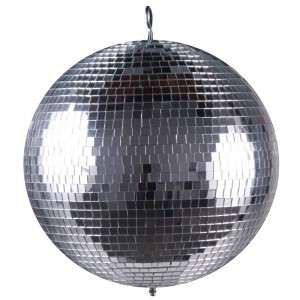
From an Amazon review of Sir Arthur Quiller-Couch’s 1919 lecture series, The Art of Reading:
Until fairly recently a girl’s school in the east of England had the school motto “Video, Audio, Disco.” No prizes for guessing why it was changed. But in Latin it is a reasonable aspiration for a school: I see, I hear, I learn.
February 9, 2014 @ 9:03 pm | Filed under:
Television 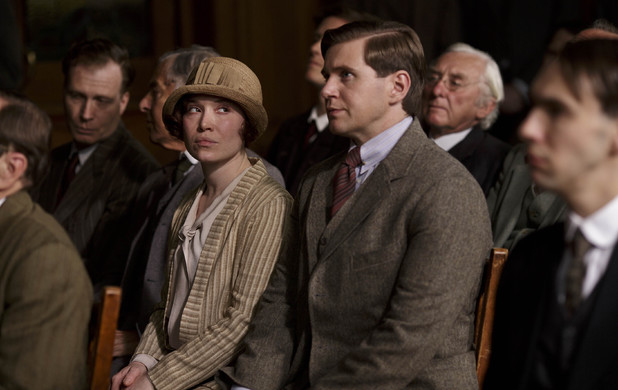
“You do realize even Alfred gets more screen time than you do?”
(UK / DVD episode 7. Also, spoilers below.)
Telegram! Robert has been summoned to America by Cora’s Horrible American Mother to assist Cora’s Impossible American Brother. There’s a scandal involving oil and a Senate committee who may or may not be favorably impressed by a titled brother-in-law, because nothing says respectable like an impoverished English earl who snaps up an American heiress to save his estate, and then loses her fortune on bad investments.
Bit of a flurry over the notion that Bates must accompany Lord Grantham to America. (I love how it’s always “America.” Last season, when Shirley Maclaine arrived to out-shout the Dowager, she referred to her home as “America” 100% of the time. You have to wonder if Julian Fellowes has ever chatted with any Americans long enough to discover that if you ask us where we’re from, we don’t name our country; we name our state. Unless you’re a New Yorker, in which case you name your borough.)
Anna puts on a brave face for Bates but sobs in the hall. Mrs. Hughes takes the case to Lady Mary, who puts on her best stone face and insists she would like to help, but she “must know the facts.” What is Mrs. Hughes to do? She reveals Anna’s secret, and Mary marches straight to her father and orders him to take Thomas to America instead of Bates, wearing that exact same stone face and saying, “I can’t explain it. If I could you’d agree with me.” I actually burst out laughing at this, despite the graveness of the subject matter. It’s so Mary. She expects her father to jump when she says jump and take her word that jumping is the gentlemanly thing to do in this circumstance. But by golly, nobody’d better expect her to take any request on faith.
All right, then, it’s settled, Bates stays, Thomas goes, Mary has a moment with Bates (“It wasn’t your fault, Bates. It wasn’t Anna’s, but it wasn’t yours, either”), and—HOLD ON EVERYONE, THE PIGS ARE COMING!
(more…)








